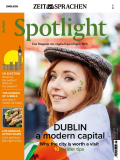Starten Sie den Audio-Text
Mit dem Audio-Player können Sie sich den Text anhören. Darunter finden Sie das Transkript.
Click here to open the transcript
[On the subject of sources]
In terms of checking sources, I would say half of our time goes to checking sources. We have to be really, really sure that the information we’re writing is correct and the information we’re promoting is correct and that’s something that really… you know, fake news and disinformation is such a problem everywhere in the world. You know, no culture and no political system is immune to that. So that’s something that’s at the forefront of our minds. Mostly, I mean, the BBC is an excellent source. I use Al Jazeera quite a lot for Middle East issues, France 24, DW as well. I use American outlets such as Washington Post, New York Times. But when we’re researching other parts of the world that we’re maybe less familiar with, we have to consult sources that we’re not familiar with. So, for example, I had to do a briefing on the security situation in the Punjab in India. I don’t know the local media landscape in that part of the world. So, it was really about, you know, reading information that I could find from different sources, but then also doing a deep dive on the source itself, so you’re kind of doubling your workload in a way, but it’s just necessary. And, you know, I’ve come across pieces of information and it’s perfectly fine to say I’m not going to write that, I’m not going to put that in. It might be true, but I can’t verify it. And if I can’t verify it, then I won’t send it to politicians. Because at the end of the day, it’s everyone’s reputation that’s at stake, and I don’t want to, through my error, have an MP saying something that’s not correct. So that is a big and ever-present pressure, but it’s very necessary.


